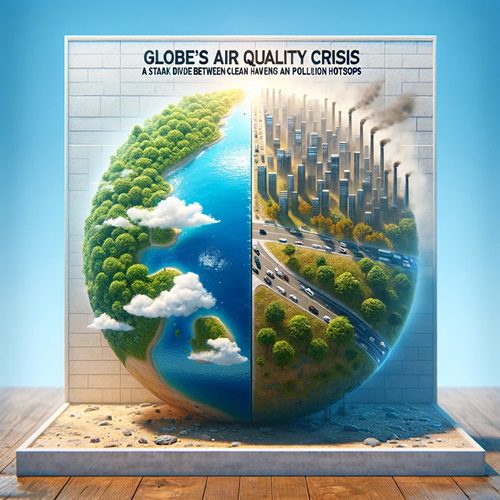 In the latest unveiling by IQAir, the 2023 World Air Quality Report casts a revealing light on the persistent and pervasive challenge of air pollution across the globe. This meticulous analysis, the sixth of its kind, offers a comprehensive overview of the air we breathe, drawing on data from an expansive network of over 30,000 air quality monitoring stations spanning 7,812 locales in 134 countries. The findings are both a cause for concern and a call to action, spotlighting the urgent need for concerted efforts to combat air pollution and protect public health.
In the latest unveiling by IQAir, the 2023 World Air Quality Report casts a revealing light on the persistent and pervasive challenge of air pollution across the globe. This meticulous analysis, the sixth of its kind, offers a comprehensive overview of the air we breathe, drawing on data from an expansive network of over 30,000 air quality monitoring stations spanning 7,812 locales in 134 countries. The findings are both a cause for concern and a call to action, spotlighting the urgent need for concerted efforts to combat air pollution and protect public health.
Notably, the report identifies just seven nations – Australia, Estonia, Finland, Grenada, Iceland, Mauritius, and New Zealand – that have successfully met the World Health Organization’s stringent annual guideline for PM2.5 levels, set at a mere five µg/m3. This stark figure highlights the exceptional nature of their achievement in a world where the vast majority, 92.5% of analyzed countries, have air quality that fails to meet this critical health standard.
The dichotomy between the cleanest and most polluted environments is stark. On one end of the spectrum, countries like Bangladesh, Pakistan, India, Tajikistan, and Burkina Faso bear the brunt of air pollution levels that exceed the WHO guidelines and do so by more than tenfold in some instances. Such disparities underscore the uneven distribution of air pollution and its burden, disproportionately affecting specific regions and their citizens.
Africa’s significant underrepresentation in air quality data, with a third of its populace in the dark about the air they breathe, further exacerbates this global health issue. Meanwhile, Southeast Asia grapples with rising PM2.5 concentrations due to climate conditions and transboundary haze, underscoring air quality challenges’ complex, interconnected nature.
Central & South Asia emerge as particularly troubled, housing the world’s top ten most polluted cities, with India alone claiming four of these dubious distinctions. The situation in North America is equally alarming, with Canada being recorded as the most polluted country in the region for the first time, highlighting the pervasive nature of air pollution across both developing and developed nations.
The reliance on low-cost sensors for air quality data in regions like Latin America & the Caribbean, where 70% of real-time data originates from such devices, points to the growing importance of grassroots efforts in bridging the gap in air quality monitoring. These community-driven initiatives underscore the vital role of citizen scientists, local organizations, and advocates in advancing our understanding and mitigation of air pollution.
Echoing the gravity of these findings, Frank Hammes, Global CEO of IQAir, emphasizes air quality as a cornerstone of a clean, healthy, and sustainable environment. This universal human right remains out of reach for many. “Air quality data saves lives,” Hammes asserts, highlighting the transformative power of information in driving action and improving air quality.
The disproportionate exposure of vulnerable and underrepresented groups to harmful air pollution, coupled with glaring gaps in monitoring data, underlines the critical need for expanding air quality monitoring coverage worldwide. Aidan Farrow, senior air Quality Scientist at Greenpeace International, further reinforces this call to action, stressing the urgent need for local, national, and international efforts to address the causes of air pollution, manage transboundary haze, and reduce reliance on combustion as an energy source.
In a world grappling with the global health catastrophe of air pollution, the 2023 IQAir World Air Quality Report is a stark reminder of the enduring injustices and the imperative to adopt solutions to this pressing environmental challenge. As the report reaches its global audience, the message is clear: the time for action is now.
Click here to delve deeper into the 2023 World Air Quality Report’s findings and learn how you can contribute to improving air quality.
Written by: Kanda Limw

